The Ultimate Guide to AI-powered Market Research Panels
The Ultimate Guide to AI-powered Market Research Panels
The Ultimate Guide to AI-powered Market Research Panels



In the dynamic landscape of market research, staying ahead of the curve is crucial. One of the most significant advancements in this field is the use of AI-powered market research survey tools to build and manage market research panels. AI-driven innovations bring a new level of efficiency, precision, and scalability to the process, ensuring that market research agencies gather high-quality insights to inform product development and marketing strategies. This ultimate guide will explore how AI-powered market research survey creators help build and manage consumer panels, providing detailed insights into the process.
What Are Market Research Panels?
Market research panels are groups of pre-recruited individuals who have agreed to participate in market research studies over a specified period. These panels are a valuable resource for gathering continuous insights into consumer behavior, preferences, and opinions. Panel members provide data through surveys, focus groups, interviews, and other research methods, offering businesses a reliable and consistent source of information for making informed decisions.
Traditional Research Panels vs. AI-powered Research Panels
Traditional Research Panels
Traditional research panels rely on manual processes for recruitment, management, and data collection. These panels often require significant human intervention to identify and engage participants, conduct surveys, and analyze data. While effective, this approach is time-consuming, labor-intensive, and prone to human error.
Key Characteristics:
Manual recruitment and management
Slower data collection and analysis
Higher risk of human error
Limited scalability and flexibility
AI-powered Research Panels
AI-powered research panels leverage advanced technologies like machine learning, natural language processing, and predictive analytics to streamline and enhance the entire research process. These panels automate recruitment, personalize engagement, and provide real-time insights, significantly improving efficiency, accuracy, and scalability.
Key Characteristics:
Automated recruitment and management
Real-time data collection and analysis
Reduced risk of human error
High scalability and flexibility
Types of Market Research Panels and Their Impact on Market Research
Consumer Panels
Consumer panels consist of everyday consumers who provide insights into their purchasing behaviors, preferences, and opinions on various products and services. These panels help businesses understand market trends, consumer needs, and the effectiveness of marketing strategies.
Impact:
Provides direct feedback on consumer experiences
Helps in identifying market trends and preferences
Aids in refining product offerings and marketing strategies
B2B Panels
B2B panels include professionals and decision-makers from specific industries. These panels offer insights into business trends, industry challenges, and purchasing behaviors within the B2B market.
Impact:
Provides valuable insights into industry-specific trends
Helps in understanding business needs and decision-making processes
Supports the development of B2B products and services
Healthcare Panels
Healthcare panels comprise medical professionals, patients, and caregivers who provide feedback on medical products, treatments, and healthcare services. These panels are crucial for pharmaceutical companies, healthcare providers, and medical device manufacturers.
Impact:
Offers insights into medical practices and patient experiences
Aids in the development of new treatments and medical devices
Helps in improving healthcare services and patient care
Custom Panels
Custom panels are tailored to meet the specific needs of a business or research objective. The panels include a mix of consumer, B2B, or healthcare participants, depending on the research requirements.
Impact:
Provides targeted insights for specific research objectives
Enhances the relevance and accuracy of research findings
Supports the development of tailored products and marketing strategies
Market research panels are indispensable tools for gathering continuous and reliable insights into various market segments. While traditional panels have been effective, AI-powered research panels offer significant advantages in terms of efficiency, accuracy, and scalability.
By leveraging AI technology, businesses enhance their market research efforts, leading to more informed decision-making and improved product development and marketing strategies. Understanding the different types of market research panels and their impacts help businesses choose the right approach to gain valuable insights and stay competitive in the market.
How AI-driven Market Research Panels Help Market Research Agencies
Enhanced Recruitment Efficiency
Targeted Recruitment
AI algorithms are adept at analyzing vast datasets to identify potential panel members who fit the desired demographic and psychographic profiles. This targeted recruitment approach ensures that the panel is composed of relevant and diverse participants, enhancing the quality of insights generated from the research.
Automated Outreach
AI survey tools automate the outreach process, sending personalized invitations to potential panelists via email, social media, or other channels. This automation not only saves time and resources but also increases the likelihood of recruiting suitable participants, as personalized messages are more engaging and effective.
Precision in Screening
Intelligent Pre-screening
AI-powered survey creators excel at performing initial pre-screening to filter out unsuitable candidates quickly. Using machine learning, these tools analyze responses to determine if participants meet the basic criteria before moving them to the more detailed screening stage. This ensures that only relevant candidates proceed, streamlining the process.
Adaptive Screening Questions
AI survey creators dynamically adapt screening questions based on initial responses, ensuring that only the most relevant and high-quality participants are selected for the panel. This adaptability improves the precision and relevance of the panel, ensuring that the insights gathered are pertinent to the research objectives.
Data Integration and Management
Centralized Data Management
AI tools offer centralized management of participant data, integrating information from various sources into a single platform. This centralized approach allows for easier tracking, updating, and analyzing of panel member information, ensuring that the data is always current and comprehensive.
Continuous Data Enrichment
AI-powered market research survey platforms continuously enrich panelist profiles by integrating new data from various touchpoints, such as social media activity, purchase history, or previous survey responses. This ongoing enrichment provides a more holistic view of each participant, enhancing the depth and quality of insights.
Improved Participant Engagement
Personalized Communication
AI tools enable personalized communication with panel members, tailoring messages based on their preferences and past interactions. This personalization enhances engagement and fosters a positive relationship between the agency and the panelists, encouraging ongoing participation.
Gamification and Incentives
AI introduces gamification elements and personalized incentives to motivate panel members to participate in surveys. By making the survey-taking experience more enjoyable, AI helps maintain high levels of engagement and participation, ensuring that the panel remains active and responsive.
Advanced Data Analysis
Real-Time Insights
AI-powered survey creators provide real-time data analysis, allowing researchers to monitor responses as they come in. This real-time insight enables quick adjustments to the survey or recruitment process, ensuring that the panel remains relevant and up-to-date.
Predictive Analytics
AI uses predictive analytics to forecast trends and participant behavior. This capability helps agencies understand potential shifts in panelist attitudes and preferences, allowing for proactive adjustments in the research strategy. By anticipating changes, market research agencies stay ahead of the curve and maintain the relevance of their market research.
Scalability and Flexibility
Scalable Recruitment
AI-powered tools are designed to handle large-scale recruitment efforts, efficiently managing thousands of potential panelists simultaneously. This scalability is crucial for agencies conducting extensive market research studies, as it ensures that the panel grows and adapts to meet the needs of the research.
Flexible Panel Management
AI allows for flexible management of the panel, enabling researchers to easily update screening criteria, segment participants, and deploy targeted surveys based on evolving research needs. This flexibility ensures that the panel remains aligned with the research objectives, allowing for ongoing refinement and optimization.
Ethical and Compliance Assurance
Data Privacy Compliance
AI tools come equipped with features that ensure compliance with data privacy regulations such as GDPR and CCPA. These tools manage consent forms, anonymize data, and securely store participant information, ensuring that ethical standards are maintained throughout the research process.
Transparent Practices
AI survey creators help market research agencies implement transparent practices by clearly communicating the purpose of the research, how the data will be used, and obtaining informed consent from participants. This transparency builds trust and fosters a positive relationship with panel members, encouraging honest and accurate responses.
Use Case Example
Consider a market research agency looking to build a consumer panel for a new product launch. The agency uses an AI-powered survey creator to streamline the process:
Recruitment:
The AI tool analyzes social media data and purchase histories to identify potential panel members who match the target demographic.
Automated outreach invites these individuals to join the panel, providing personalized messages that highlight the benefits of participation.
Screening:
Pre-screening surveys filter out unsuitable candidates by assessing basic criteria such as age, location, and product usage.
Detailed screening questions, adapted in real-time based on responses, ensure that selected panelists meet specific requirements related to product preferences and behaviors.
Engagement:
Personalized emails and gamified survey experiences keep panel members engaged and motivated.
The AI tool offers tailored incentives based on individual preferences, increasing participation rates.
Data Management:
All participant data is centralized, allowing for easy tracking and analysis.
Continuous data enrichment ensures a comprehensive view of each panel member, enhancing the quality of insights.
Analysis and Adaptation:
Real-time analysis provides immediate insights, enabling quick adjustments to the survey or panel composition.
Predictive analytics forecast trends, helping the agency stay ahead of potential shifts in consumer behavior.
Conclusion
AI-powered survey creators like Metaforms.ai significantly enhance the process of building and managing market research consumer panels. By automating market research panel recruitment, improving screening precision, enhancing participant engagement, and providing advanced data analysis, AI survey tools make the process more efficient, accurate, and scalable. For market research agencies, leveraging AI technology is essential for developing high-quality, relevant consumer panels that deliver valuable insights for product development and marketing strategies. Sign-up with Metaforms today!
In the dynamic landscape of market research, staying ahead of the curve is crucial. One of the most significant advancements in this field is the use of AI-powered market research survey tools to build and manage market research panels. AI-driven innovations bring a new level of efficiency, precision, and scalability to the process, ensuring that market research agencies gather high-quality insights to inform product development and marketing strategies. This ultimate guide will explore how AI-powered market research survey creators help build and manage consumer panels, providing detailed insights into the process.
What Are Market Research Panels?
Market research panels are groups of pre-recruited individuals who have agreed to participate in market research studies over a specified period. These panels are a valuable resource for gathering continuous insights into consumer behavior, preferences, and opinions. Panel members provide data through surveys, focus groups, interviews, and other research methods, offering businesses a reliable and consistent source of information for making informed decisions.
Traditional Research Panels vs. AI-powered Research Panels
Traditional Research Panels
Traditional research panels rely on manual processes for recruitment, management, and data collection. These panels often require significant human intervention to identify and engage participants, conduct surveys, and analyze data. While effective, this approach is time-consuming, labor-intensive, and prone to human error.
Key Characteristics:
Manual recruitment and management
Slower data collection and analysis
Higher risk of human error
Limited scalability and flexibility
AI-powered Research Panels
AI-powered research panels leverage advanced technologies like machine learning, natural language processing, and predictive analytics to streamline and enhance the entire research process. These panels automate recruitment, personalize engagement, and provide real-time insights, significantly improving efficiency, accuracy, and scalability.
Key Characteristics:
Automated recruitment and management
Real-time data collection and analysis
Reduced risk of human error
High scalability and flexibility
Types of Market Research Panels and Their Impact on Market Research
Consumer Panels
Consumer panels consist of everyday consumers who provide insights into their purchasing behaviors, preferences, and opinions on various products and services. These panels help businesses understand market trends, consumer needs, and the effectiveness of marketing strategies.
Impact:
Provides direct feedback on consumer experiences
Helps in identifying market trends and preferences
Aids in refining product offerings and marketing strategies
B2B Panels
B2B panels include professionals and decision-makers from specific industries. These panels offer insights into business trends, industry challenges, and purchasing behaviors within the B2B market.
Impact:
Provides valuable insights into industry-specific trends
Helps in understanding business needs and decision-making processes
Supports the development of B2B products and services
Healthcare Panels
Healthcare panels comprise medical professionals, patients, and caregivers who provide feedback on medical products, treatments, and healthcare services. These panels are crucial for pharmaceutical companies, healthcare providers, and medical device manufacturers.
Impact:
Offers insights into medical practices and patient experiences
Aids in the development of new treatments and medical devices
Helps in improving healthcare services and patient care
Custom Panels
Custom panels are tailored to meet the specific needs of a business or research objective. The panels include a mix of consumer, B2B, or healthcare participants, depending on the research requirements.
Impact:
Provides targeted insights for specific research objectives
Enhances the relevance and accuracy of research findings
Supports the development of tailored products and marketing strategies
Market research panels are indispensable tools for gathering continuous and reliable insights into various market segments. While traditional panels have been effective, AI-powered research panels offer significant advantages in terms of efficiency, accuracy, and scalability.
By leveraging AI technology, businesses enhance their market research efforts, leading to more informed decision-making and improved product development and marketing strategies. Understanding the different types of market research panels and their impacts help businesses choose the right approach to gain valuable insights and stay competitive in the market.
How AI-driven Market Research Panels Help Market Research Agencies
Enhanced Recruitment Efficiency
Targeted Recruitment
AI algorithms are adept at analyzing vast datasets to identify potential panel members who fit the desired demographic and psychographic profiles. This targeted recruitment approach ensures that the panel is composed of relevant and diverse participants, enhancing the quality of insights generated from the research.
Automated Outreach
AI survey tools automate the outreach process, sending personalized invitations to potential panelists via email, social media, or other channels. This automation not only saves time and resources but also increases the likelihood of recruiting suitable participants, as personalized messages are more engaging and effective.
Precision in Screening
Intelligent Pre-screening
AI-powered survey creators excel at performing initial pre-screening to filter out unsuitable candidates quickly. Using machine learning, these tools analyze responses to determine if participants meet the basic criteria before moving them to the more detailed screening stage. This ensures that only relevant candidates proceed, streamlining the process.
Adaptive Screening Questions
AI survey creators dynamically adapt screening questions based on initial responses, ensuring that only the most relevant and high-quality participants are selected for the panel. This adaptability improves the precision and relevance of the panel, ensuring that the insights gathered are pertinent to the research objectives.
Data Integration and Management
Centralized Data Management
AI tools offer centralized management of participant data, integrating information from various sources into a single platform. This centralized approach allows for easier tracking, updating, and analyzing of panel member information, ensuring that the data is always current and comprehensive.
Continuous Data Enrichment
AI-powered market research survey platforms continuously enrich panelist profiles by integrating new data from various touchpoints, such as social media activity, purchase history, or previous survey responses. This ongoing enrichment provides a more holistic view of each participant, enhancing the depth and quality of insights.
Improved Participant Engagement
Personalized Communication
AI tools enable personalized communication with panel members, tailoring messages based on their preferences and past interactions. This personalization enhances engagement and fosters a positive relationship between the agency and the panelists, encouraging ongoing participation.
Gamification and Incentives
AI introduces gamification elements and personalized incentives to motivate panel members to participate in surveys. By making the survey-taking experience more enjoyable, AI helps maintain high levels of engagement and participation, ensuring that the panel remains active and responsive.
Advanced Data Analysis
Real-Time Insights
AI-powered survey creators provide real-time data analysis, allowing researchers to monitor responses as they come in. This real-time insight enables quick adjustments to the survey or recruitment process, ensuring that the panel remains relevant and up-to-date.
Predictive Analytics
AI uses predictive analytics to forecast trends and participant behavior. This capability helps agencies understand potential shifts in panelist attitudes and preferences, allowing for proactive adjustments in the research strategy. By anticipating changes, market research agencies stay ahead of the curve and maintain the relevance of their market research.
Scalability and Flexibility
Scalable Recruitment
AI-powered tools are designed to handle large-scale recruitment efforts, efficiently managing thousands of potential panelists simultaneously. This scalability is crucial for agencies conducting extensive market research studies, as it ensures that the panel grows and adapts to meet the needs of the research.
Flexible Panel Management
AI allows for flexible management of the panel, enabling researchers to easily update screening criteria, segment participants, and deploy targeted surveys based on evolving research needs. This flexibility ensures that the panel remains aligned with the research objectives, allowing for ongoing refinement and optimization.
Ethical and Compliance Assurance
Data Privacy Compliance
AI tools come equipped with features that ensure compliance with data privacy regulations such as GDPR and CCPA. These tools manage consent forms, anonymize data, and securely store participant information, ensuring that ethical standards are maintained throughout the research process.
Transparent Practices
AI survey creators help market research agencies implement transparent practices by clearly communicating the purpose of the research, how the data will be used, and obtaining informed consent from participants. This transparency builds trust and fosters a positive relationship with panel members, encouraging honest and accurate responses.
Use Case Example
Consider a market research agency looking to build a consumer panel for a new product launch. The agency uses an AI-powered survey creator to streamline the process:
Recruitment:
The AI tool analyzes social media data and purchase histories to identify potential panel members who match the target demographic.
Automated outreach invites these individuals to join the panel, providing personalized messages that highlight the benefits of participation.
Screening:
Pre-screening surveys filter out unsuitable candidates by assessing basic criteria such as age, location, and product usage.
Detailed screening questions, adapted in real-time based on responses, ensure that selected panelists meet specific requirements related to product preferences and behaviors.
Engagement:
Personalized emails and gamified survey experiences keep panel members engaged and motivated.
The AI tool offers tailored incentives based on individual preferences, increasing participation rates.
Data Management:
All participant data is centralized, allowing for easy tracking and analysis.
Continuous data enrichment ensures a comprehensive view of each panel member, enhancing the quality of insights.
Analysis and Adaptation:
Real-time analysis provides immediate insights, enabling quick adjustments to the survey or panel composition.
Predictive analytics forecast trends, helping the agency stay ahead of potential shifts in consumer behavior.
Conclusion
AI-powered survey creators like Metaforms.ai significantly enhance the process of building and managing market research consumer panels. By automating market research panel recruitment, improving screening precision, enhancing participant engagement, and providing advanced data analysis, AI survey tools make the process more efficient, accurate, and scalable. For market research agencies, leveraging AI technology is essential for developing high-quality, relevant consumer panels that deliver valuable insights for product development and marketing strategies. Sign-up with Metaforms today!
In the dynamic landscape of market research, staying ahead of the curve is crucial. One of the most significant advancements in this field is the use of AI-powered market research survey tools to build and manage market research panels. AI-driven innovations bring a new level of efficiency, precision, and scalability to the process, ensuring that market research agencies gather high-quality insights to inform product development and marketing strategies. This ultimate guide will explore how AI-powered market research survey creators help build and manage consumer panels, providing detailed insights into the process.
What Are Market Research Panels?
Market research panels are groups of pre-recruited individuals who have agreed to participate in market research studies over a specified period. These panels are a valuable resource for gathering continuous insights into consumer behavior, preferences, and opinions. Panel members provide data through surveys, focus groups, interviews, and other research methods, offering businesses a reliable and consistent source of information for making informed decisions.
Traditional Research Panels vs. AI-powered Research Panels
Traditional Research Panels
Traditional research panels rely on manual processes for recruitment, management, and data collection. These panels often require significant human intervention to identify and engage participants, conduct surveys, and analyze data. While effective, this approach is time-consuming, labor-intensive, and prone to human error.
Key Characteristics:
Manual recruitment and management
Slower data collection and analysis
Higher risk of human error
Limited scalability and flexibility
AI-powered Research Panels
AI-powered research panels leverage advanced technologies like machine learning, natural language processing, and predictive analytics to streamline and enhance the entire research process. These panels automate recruitment, personalize engagement, and provide real-time insights, significantly improving efficiency, accuracy, and scalability.
Key Characteristics:
Automated recruitment and management
Real-time data collection and analysis
Reduced risk of human error
High scalability and flexibility
Types of Market Research Panels and Their Impact on Market Research
Consumer Panels
Consumer panels consist of everyday consumers who provide insights into their purchasing behaviors, preferences, and opinions on various products and services. These panels help businesses understand market trends, consumer needs, and the effectiveness of marketing strategies.
Impact:
Provides direct feedback on consumer experiences
Helps in identifying market trends and preferences
Aids in refining product offerings and marketing strategies
B2B Panels
B2B panels include professionals and decision-makers from specific industries. These panels offer insights into business trends, industry challenges, and purchasing behaviors within the B2B market.
Impact:
Provides valuable insights into industry-specific trends
Helps in understanding business needs and decision-making processes
Supports the development of B2B products and services
Healthcare Panels
Healthcare panels comprise medical professionals, patients, and caregivers who provide feedback on medical products, treatments, and healthcare services. These panels are crucial for pharmaceutical companies, healthcare providers, and medical device manufacturers.
Impact:
Offers insights into medical practices and patient experiences
Aids in the development of new treatments and medical devices
Helps in improving healthcare services and patient care
Custom Panels
Custom panels are tailored to meet the specific needs of a business or research objective. The panels include a mix of consumer, B2B, or healthcare participants, depending on the research requirements.
Impact:
Provides targeted insights for specific research objectives
Enhances the relevance and accuracy of research findings
Supports the development of tailored products and marketing strategies
Market research panels are indispensable tools for gathering continuous and reliable insights into various market segments. While traditional panels have been effective, AI-powered research panels offer significant advantages in terms of efficiency, accuracy, and scalability.
By leveraging AI technology, businesses enhance their market research efforts, leading to more informed decision-making and improved product development and marketing strategies. Understanding the different types of market research panels and their impacts help businesses choose the right approach to gain valuable insights and stay competitive in the market.
How AI-driven Market Research Panels Help Market Research Agencies
Enhanced Recruitment Efficiency
Targeted Recruitment
AI algorithms are adept at analyzing vast datasets to identify potential panel members who fit the desired demographic and psychographic profiles. This targeted recruitment approach ensures that the panel is composed of relevant and diverse participants, enhancing the quality of insights generated from the research.
Automated Outreach
AI survey tools automate the outreach process, sending personalized invitations to potential panelists via email, social media, or other channels. This automation not only saves time and resources but also increases the likelihood of recruiting suitable participants, as personalized messages are more engaging and effective.
Precision in Screening
Intelligent Pre-screening
AI-powered survey creators excel at performing initial pre-screening to filter out unsuitable candidates quickly. Using machine learning, these tools analyze responses to determine if participants meet the basic criteria before moving them to the more detailed screening stage. This ensures that only relevant candidates proceed, streamlining the process.
Adaptive Screening Questions
AI survey creators dynamically adapt screening questions based on initial responses, ensuring that only the most relevant and high-quality participants are selected for the panel. This adaptability improves the precision and relevance of the panel, ensuring that the insights gathered are pertinent to the research objectives.
Data Integration and Management
Centralized Data Management
AI tools offer centralized management of participant data, integrating information from various sources into a single platform. This centralized approach allows for easier tracking, updating, and analyzing of panel member information, ensuring that the data is always current and comprehensive.
Continuous Data Enrichment
AI-powered market research survey platforms continuously enrich panelist profiles by integrating new data from various touchpoints, such as social media activity, purchase history, or previous survey responses. This ongoing enrichment provides a more holistic view of each participant, enhancing the depth and quality of insights.
Improved Participant Engagement
Personalized Communication
AI tools enable personalized communication with panel members, tailoring messages based on their preferences and past interactions. This personalization enhances engagement and fosters a positive relationship between the agency and the panelists, encouraging ongoing participation.
Gamification and Incentives
AI introduces gamification elements and personalized incentives to motivate panel members to participate in surveys. By making the survey-taking experience more enjoyable, AI helps maintain high levels of engagement and participation, ensuring that the panel remains active and responsive.
Advanced Data Analysis
Real-Time Insights
AI-powered survey creators provide real-time data analysis, allowing researchers to monitor responses as they come in. This real-time insight enables quick adjustments to the survey or recruitment process, ensuring that the panel remains relevant and up-to-date.
Predictive Analytics
AI uses predictive analytics to forecast trends and participant behavior. This capability helps agencies understand potential shifts in panelist attitudes and preferences, allowing for proactive adjustments in the research strategy. By anticipating changes, market research agencies stay ahead of the curve and maintain the relevance of their market research.
Scalability and Flexibility
Scalable Recruitment
AI-powered tools are designed to handle large-scale recruitment efforts, efficiently managing thousands of potential panelists simultaneously. This scalability is crucial for agencies conducting extensive market research studies, as it ensures that the panel grows and adapts to meet the needs of the research.
Flexible Panel Management
AI allows for flexible management of the panel, enabling researchers to easily update screening criteria, segment participants, and deploy targeted surveys based on evolving research needs. This flexibility ensures that the panel remains aligned with the research objectives, allowing for ongoing refinement and optimization.
Ethical and Compliance Assurance
Data Privacy Compliance
AI tools come equipped with features that ensure compliance with data privacy regulations such as GDPR and CCPA. These tools manage consent forms, anonymize data, and securely store participant information, ensuring that ethical standards are maintained throughout the research process.
Transparent Practices
AI survey creators help market research agencies implement transparent practices by clearly communicating the purpose of the research, how the data will be used, and obtaining informed consent from participants. This transparency builds trust and fosters a positive relationship with panel members, encouraging honest and accurate responses.
Use Case Example
Consider a market research agency looking to build a consumer panel for a new product launch. The agency uses an AI-powered survey creator to streamline the process:
Recruitment:
The AI tool analyzes social media data and purchase histories to identify potential panel members who match the target demographic.
Automated outreach invites these individuals to join the panel, providing personalized messages that highlight the benefits of participation.
Screening:
Pre-screening surveys filter out unsuitable candidates by assessing basic criteria such as age, location, and product usage.
Detailed screening questions, adapted in real-time based on responses, ensure that selected panelists meet specific requirements related to product preferences and behaviors.
Engagement:
Personalized emails and gamified survey experiences keep panel members engaged and motivated.
The AI tool offers tailored incentives based on individual preferences, increasing participation rates.
Data Management:
All participant data is centralized, allowing for easy tracking and analysis.
Continuous data enrichment ensures a comprehensive view of each panel member, enhancing the quality of insights.
Analysis and Adaptation:
Real-time analysis provides immediate insights, enabling quick adjustments to the survey or panel composition.
Predictive analytics forecast trends, helping the agency stay ahead of potential shifts in consumer behavior.
Conclusion
AI-powered survey creators like Metaforms.ai significantly enhance the process of building and managing market research consumer panels. By automating market research panel recruitment, improving screening precision, enhancing participant engagement, and providing advanced data analysis, AI survey tools make the process more efficient, accurate, and scalable. For market research agencies, leveraging AI technology is essential for developing high-quality, relevant consumer panels that deliver valuable insights for product development and marketing strategies. Sign-up with Metaforms today!
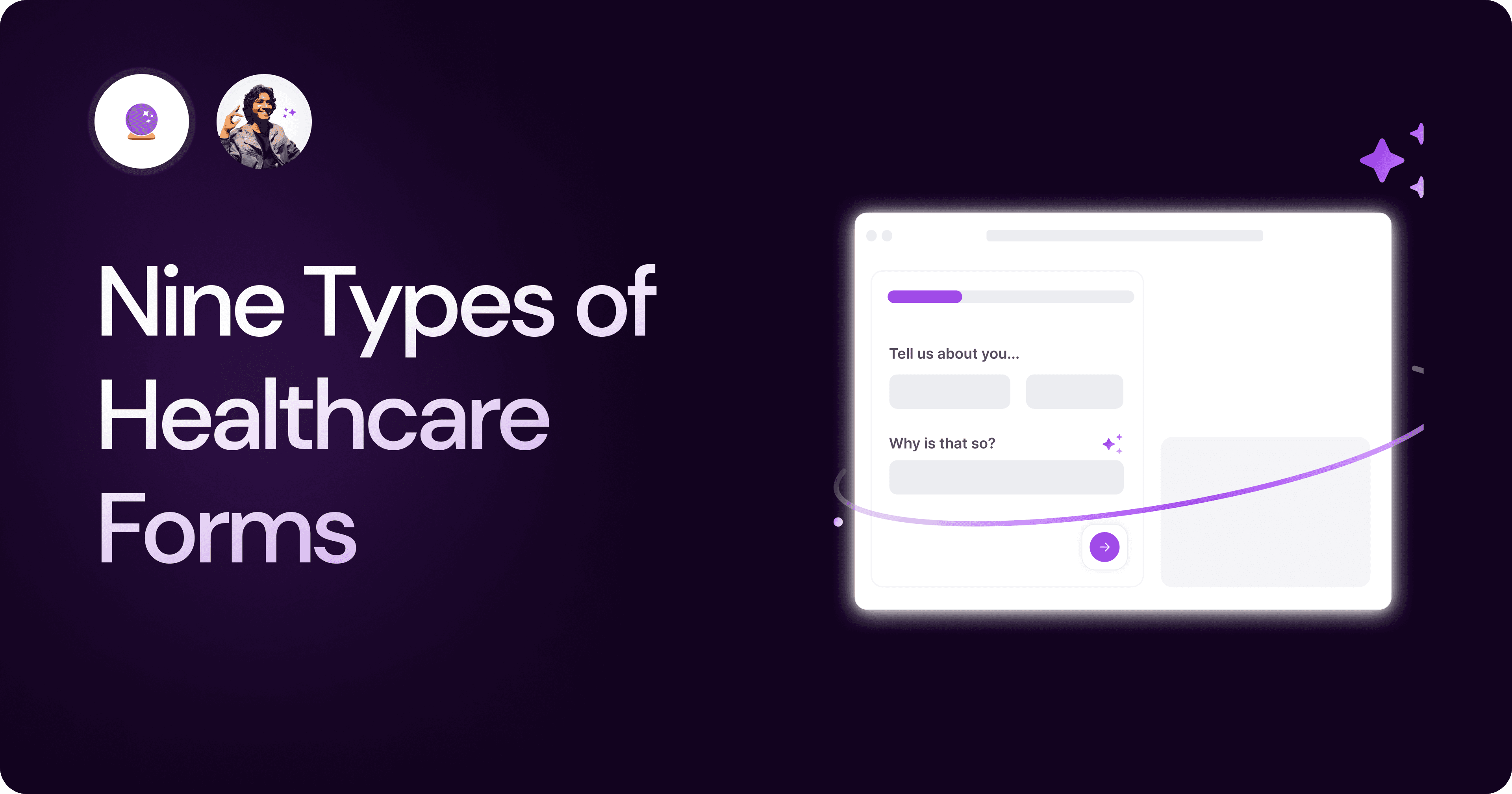
Nine Types of Healthcare and Medical Forms.
Medical forms are a must-have for any healthcare business or practitioner. Learn about the different kinds of medical and healthcare forms.
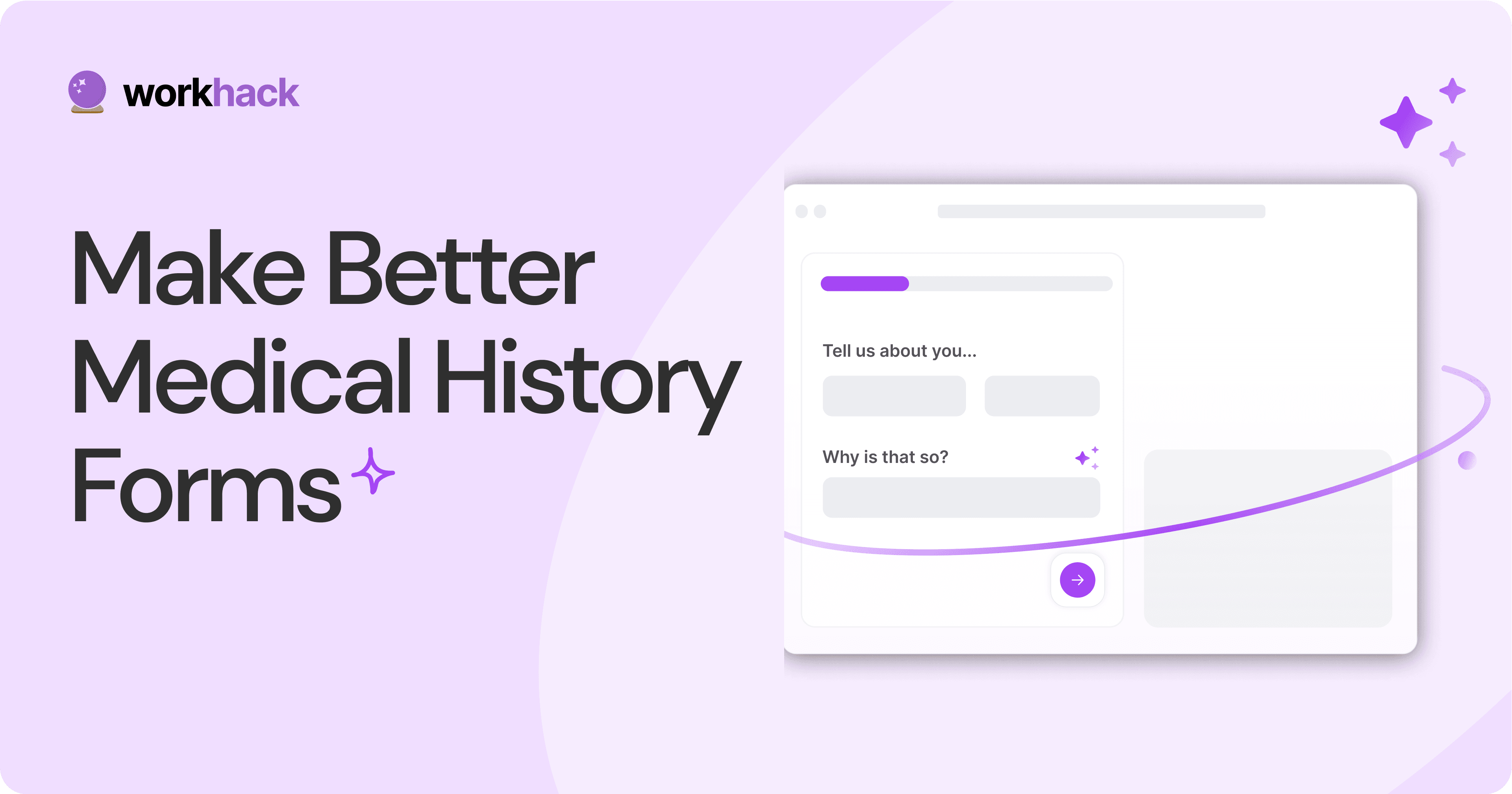
4 Tips for Better Medical History Forms.
Medical history forms are central to patient care, onboarding, and medical administration records. Learn how to make them easier to fill.
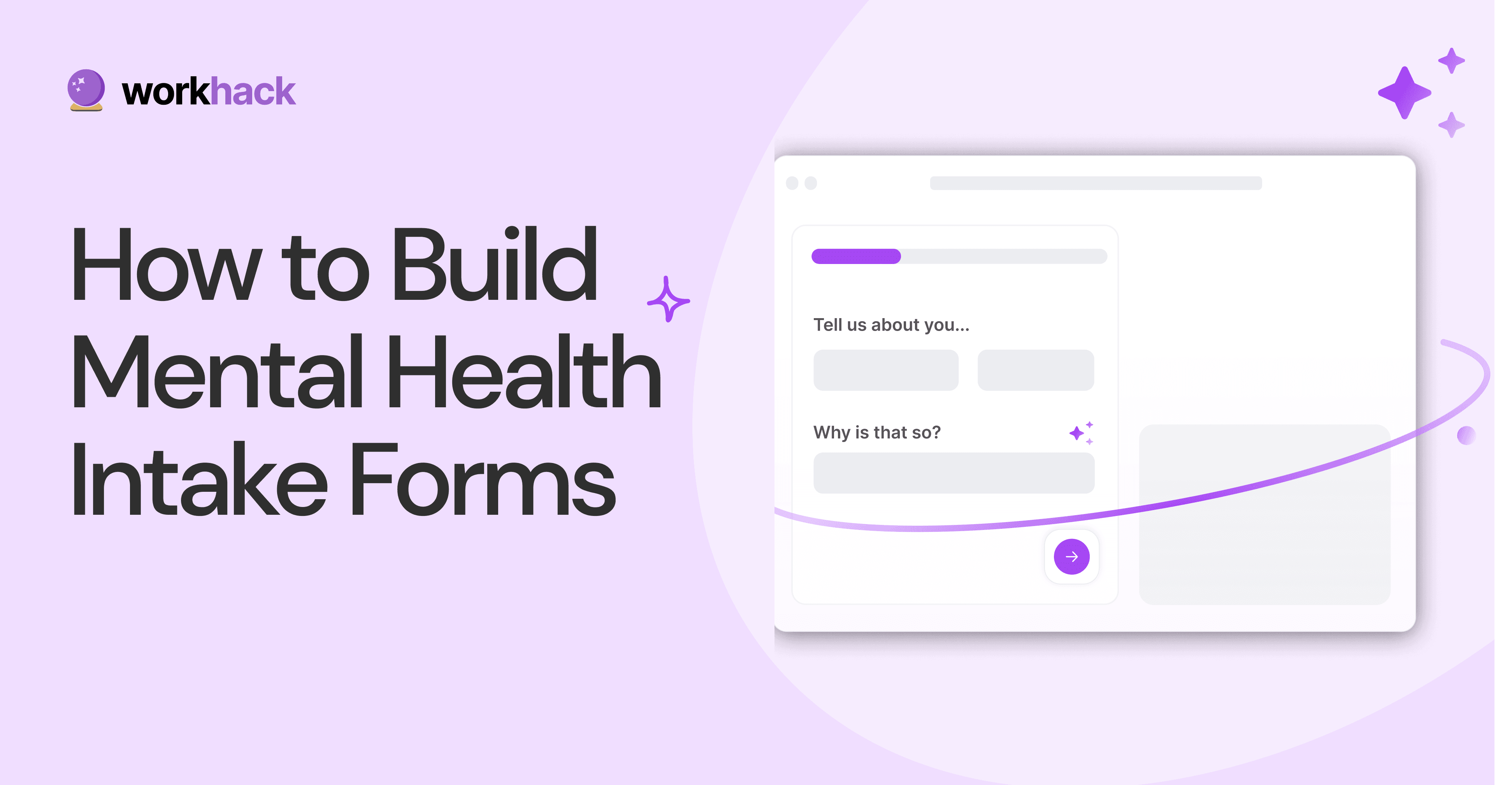
How to Build Mental Health Intake Forms?
Mental health intake forms are not like patient intake forms. Mental health intake forms deal with far more sensitive data and have specific design methods.
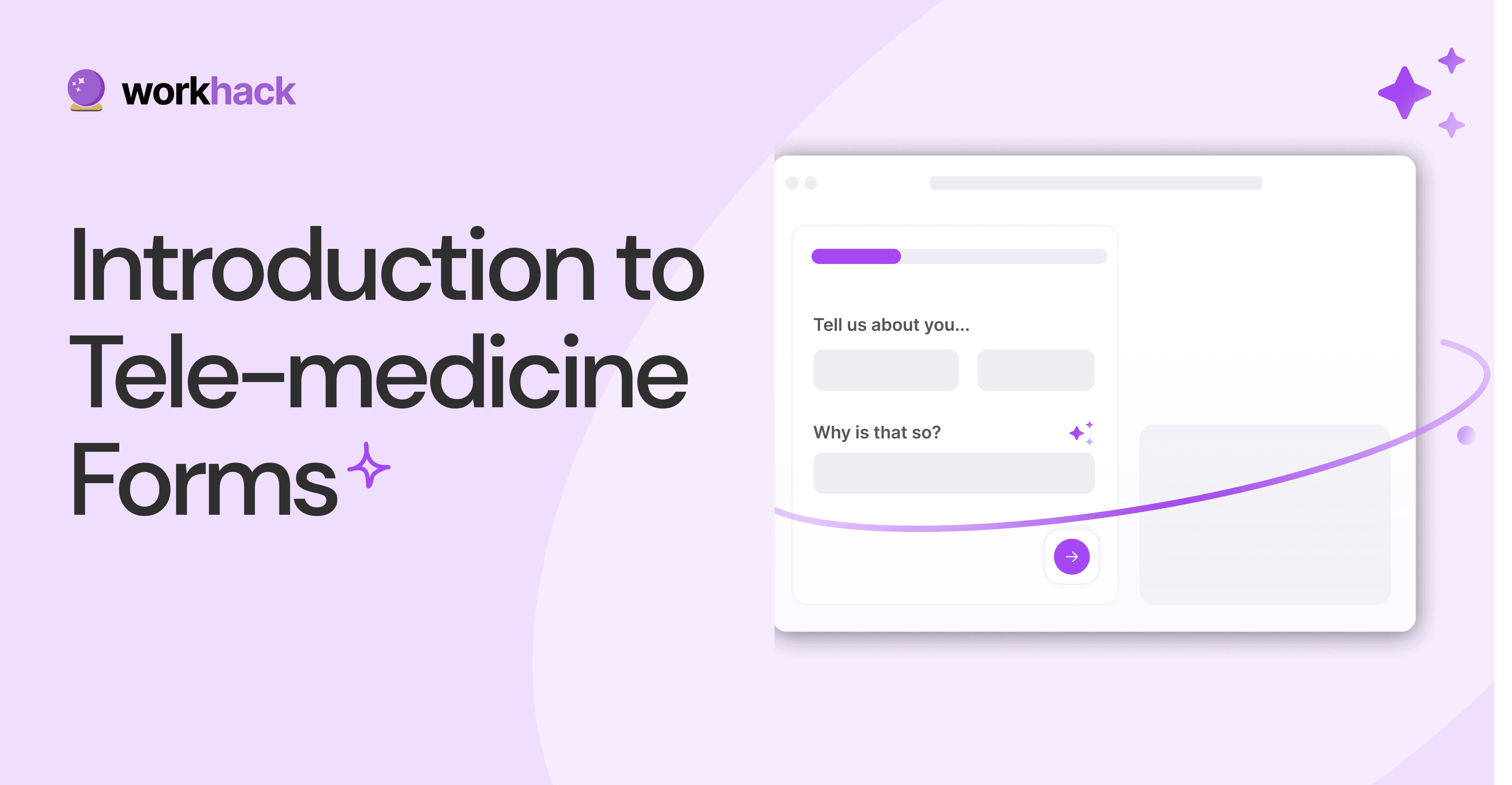
What, Why and How of Telemedicine Forms.
Telemedicine is on the rise and with different form builders out there, which one best suits your needs as a healthcare services provider?
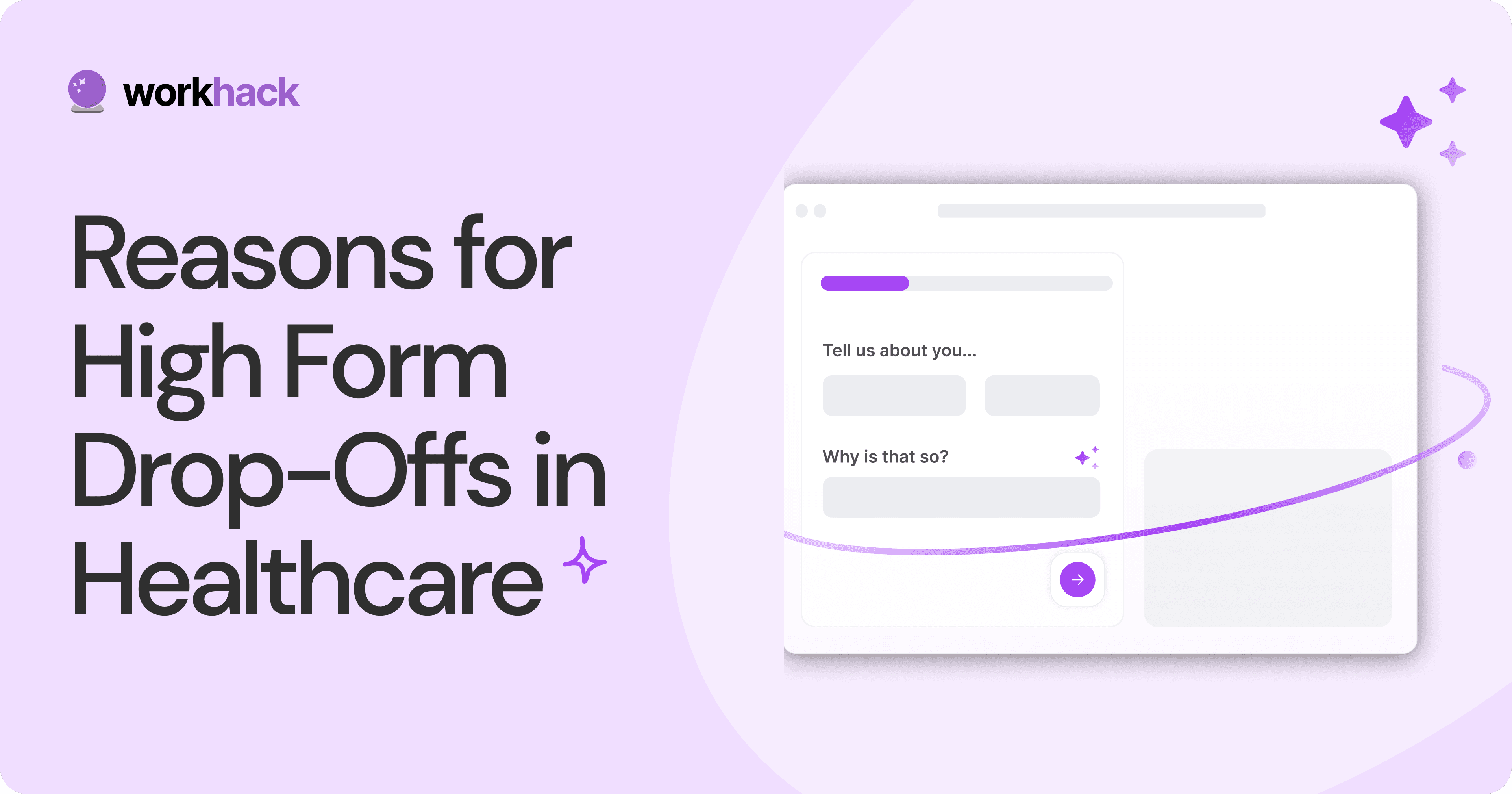
3 Reasons for Major Drop-Offs in Medical Forms.
No matter which healthcare form we pick, there are major drop-off reasons. We shall dive into the top 3 and learn how to resolve them in your next form.
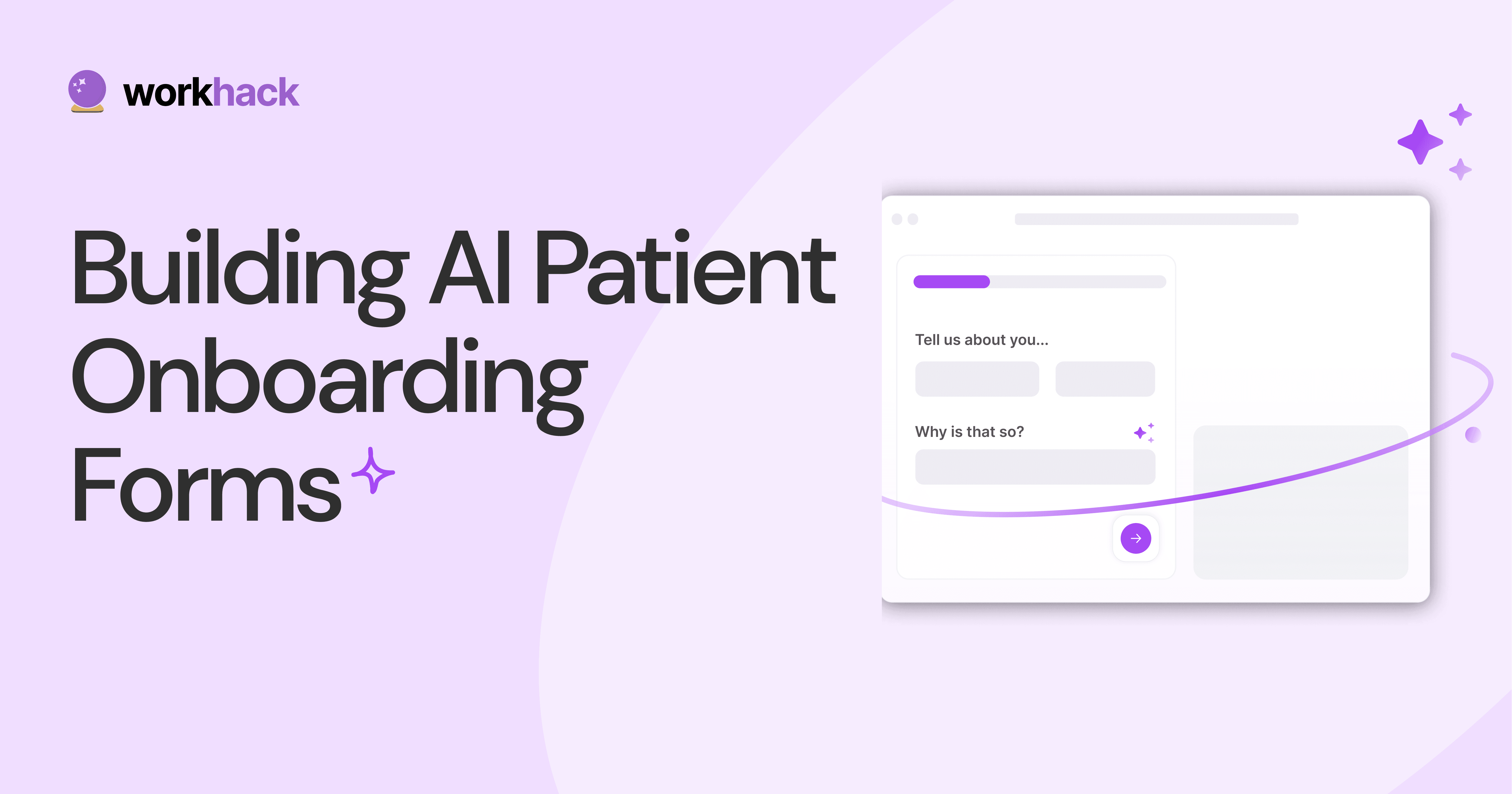
Patient Onboarding Forms - From Click to Clinic.
Patient onboarding forms are the first touchpoint for patients; getting this right for higher conversion rates is a must-have. Learn how to perfect them now.
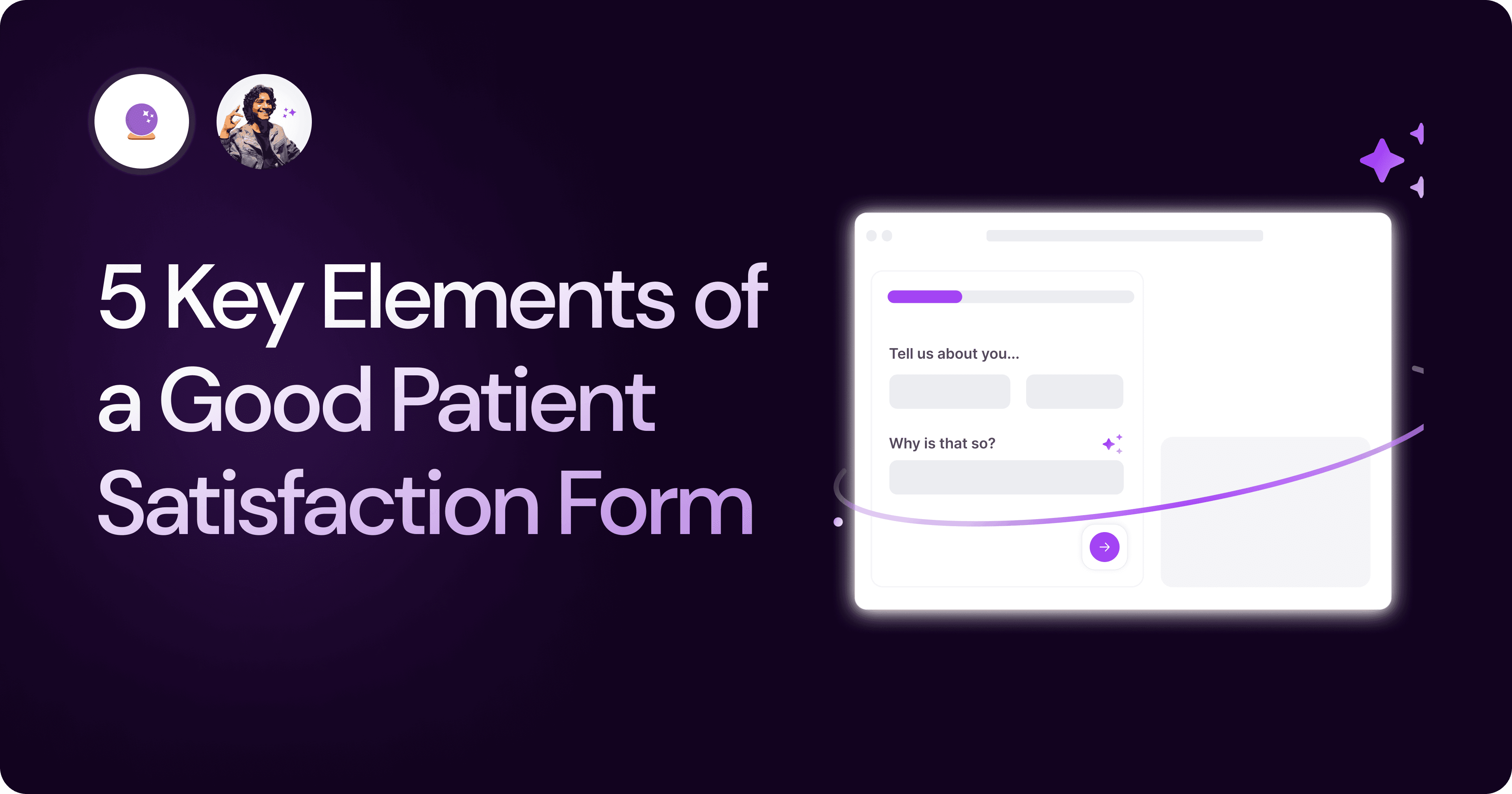
5 Key Parts of a Good Patient Satisfaction Form.
The goal of patient satisfaction surveys is to course-correct the services of a healthcare provider. Patient feedback leads to a culture of patient-centric care.
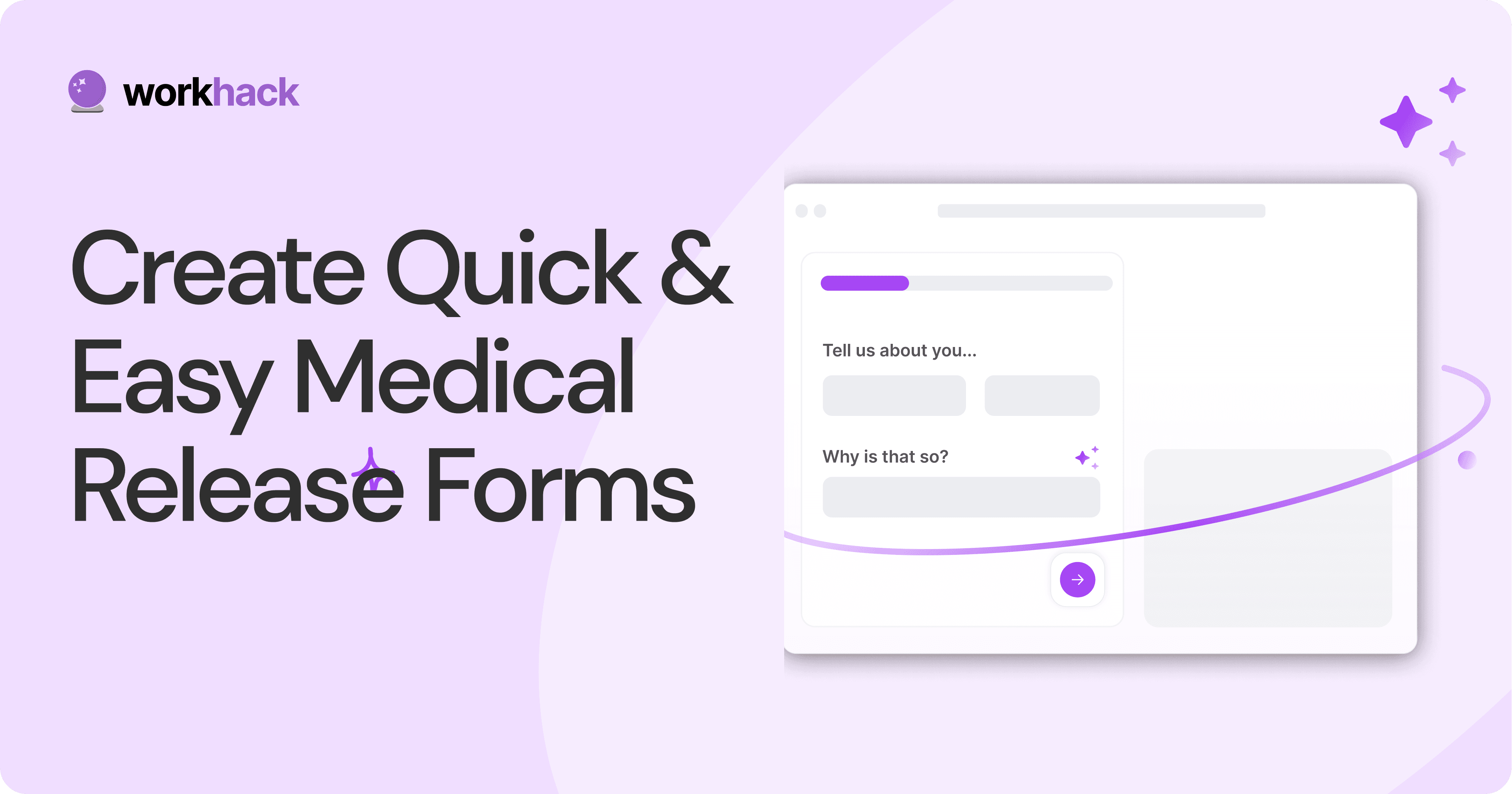
Build Quick and Easy Medical Release Forms.
Every HIPAA-compliant healthcare provider comes across medical release forms that involve details from medical history forms. Can they be shipped fast? Yes.

Nine Types of Healthcare and Medical Forms.
Medical forms are a must-have for any healthcare business or practitioner. Learn about the different kinds of medical and healthcare forms.

4 Tips for Better Medical History Forms.
Medical history forms are central to patient care, onboarding, and medical administration records. Learn how to make them easier to fill.

How to Build Mental Health Intake Forms?
Mental health intake forms are not like patient intake forms. Mental health intake forms deal with far more sensitive data and have specific design methods.

What, Why and How of Telemedicine Forms.
Telemedicine is on the rise and with different form builders out there, which one best suits your needs as a healthcare services provider?

3 Reasons for Major Drop-Offs in Medical Forms.
No matter which healthcare form we pick, there are major drop-off reasons. We shall dive into the top 3 and learn how to resolve them in your next form.

Patient Onboarding Forms - From Click to Clinic.
Patient onboarding forms are the first touchpoint for patients; getting this right for higher conversion rates is a must-have. Learn how to perfect them now.

5 Key Parts of a Good Patient Satisfaction Form.
The goal of patient satisfaction surveys is to course-correct the services of a healthcare provider. Patient feedback leads to a culture of patient-centric care.

Build Quick and Easy Medical Release Forms.
Every HIPAA-compliant healthcare provider comes across medical release forms that involve details from medical history forms. Can they be shipped fast? Yes.

Nine Types of Healthcare and Medical Forms.
Medical forms are a must-have for any healthcare business or practitioner. Learn about the different kinds of medical and healthcare forms.

4 Tips for Better Medical History Forms.
Medical history forms are central to patient care, onboarding, and medical administration records. Learn how to make them easier to fill.

How to Build Mental Health Intake Forms?
Mental health intake forms are not like patient intake forms. Mental health intake forms deal with far more sensitive data and have specific design methods.

What, Why and How of Telemedicine Forms.
Telemedicine is on the rise and with different form builders out there, which one best suits your needs as a healthcare services provider?

3 Reasons for Major Drop-Offs in Medical Forms.
No matter which healthcare form we pick, there are major drop-off reasons. We shall dive into the top 3 and learn how to resolve them in your next form.

Patient Onboarding Forms - From Click to Clinic.
Patient onboarding forms are the first touchpoint for patients; getting this right for higher conversion rates is a must-have. Learn how to perfect them now.

5 Key Parts of a Good Patient Satisfaction Form.
The goal of patient satisfaction surveys is to course-correct the services of a healthcare provider. Patient feedback leads to a culture of patient-centric care.

Build Quick and Easy Medical Release Forms.
Every HIPAA-compliant healthcare provider comes across medical release forms that involve details from medical history forms. Can they be shipped fast? Yes.

Nine Types of Healthcare and Medical Forms.
Medical forms are a must-have for any healthcare business or practitioner. Learn about the different kinds of medical and healthcare forms.

4 Tips for Better Medical History Forms.
Medical history forms are central to patient care, onboarding, and medical administration records. Learn how to make them easier to fill.

How to Build Mental Health Intake Forms?
Mental health intake forms are not like patient intake forms. Mental health intake forms deal with far more sensitive data and have specific design methods.

What, Why and How of Telemedicine Forms.
Telemedicine is on the rise and with different form builders out there, which one best suits your needs as a healthcare services provider?

3 Reasons for Major Drop-Offs in Medical Forms.
No matter which healthcare form we pick, there are major drop-off reasons. We shall dive into the top 3 and learn how to resolve them in your next form.

Patient Onboarding Forms - From Click to Clinic.
Patient onboarding forms are the first touchpoint for patients; getting this right for higher conversion rates is a must-have. Learn how to perfect them now.

5 Key Parts of a Good Patient Satisfaction Form.
The goal of patient satisfaction surveys is to course-correct the services of a healthcare provider. Patient feedback leads to a culture of patient-centric care.

Build Quick and Easy Medical Release Forms.
Every HIPAA-compliant healthcare provider comes across medical release forms that involve details from medical history forms. Can they be shipped fast? Yes.
Subscribe to stay updated.
Subscribe to stay updated.
Subscribe to stay updated.
HC

HC

HC

HC

70+ people from across industries read our emails.
HC

HC

70+ people from across industries read our emails.
HC

HC

HC

70+ people from across industries read our emails.




Bangalore, India / San Francisco, US
WorkHack Inc. 2023
Bangalore, India
San Francisco, US
WorkHack Inc. 2023
WorkHack Inc. 2023
Bangalore, India / San Francisco, US
WorkHack Inc. 2023
Bangalore, India / San Francisco, US



